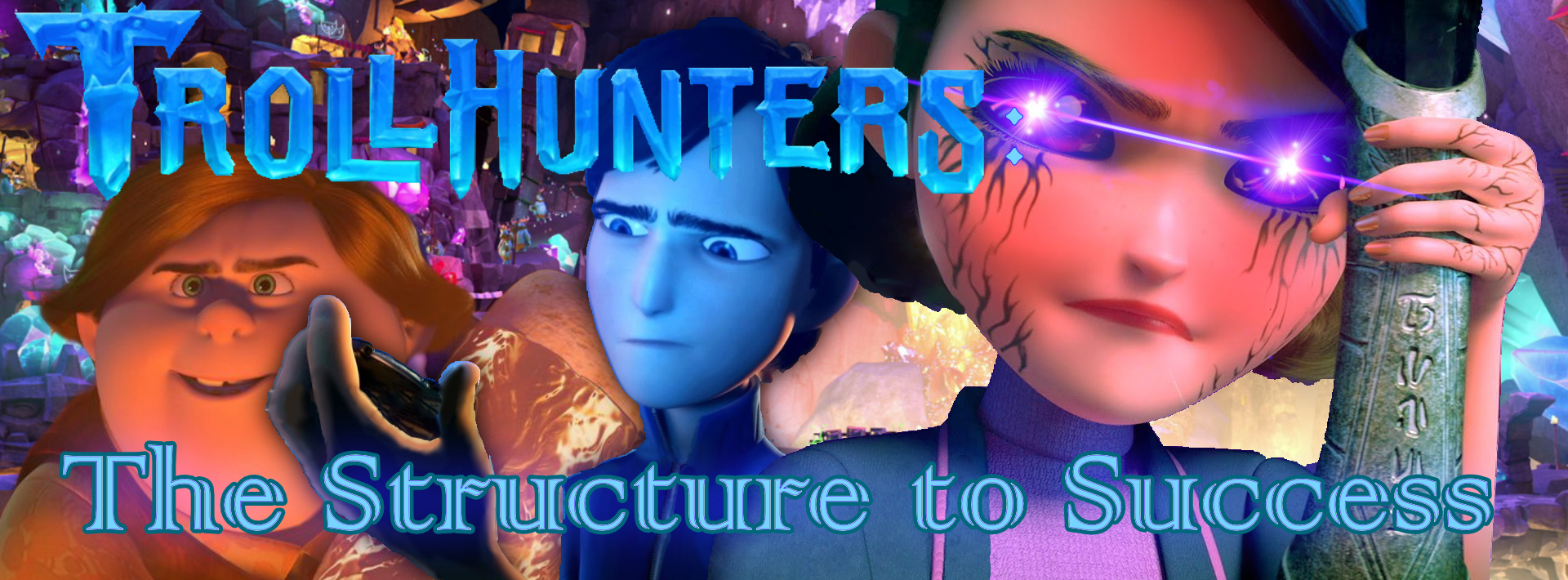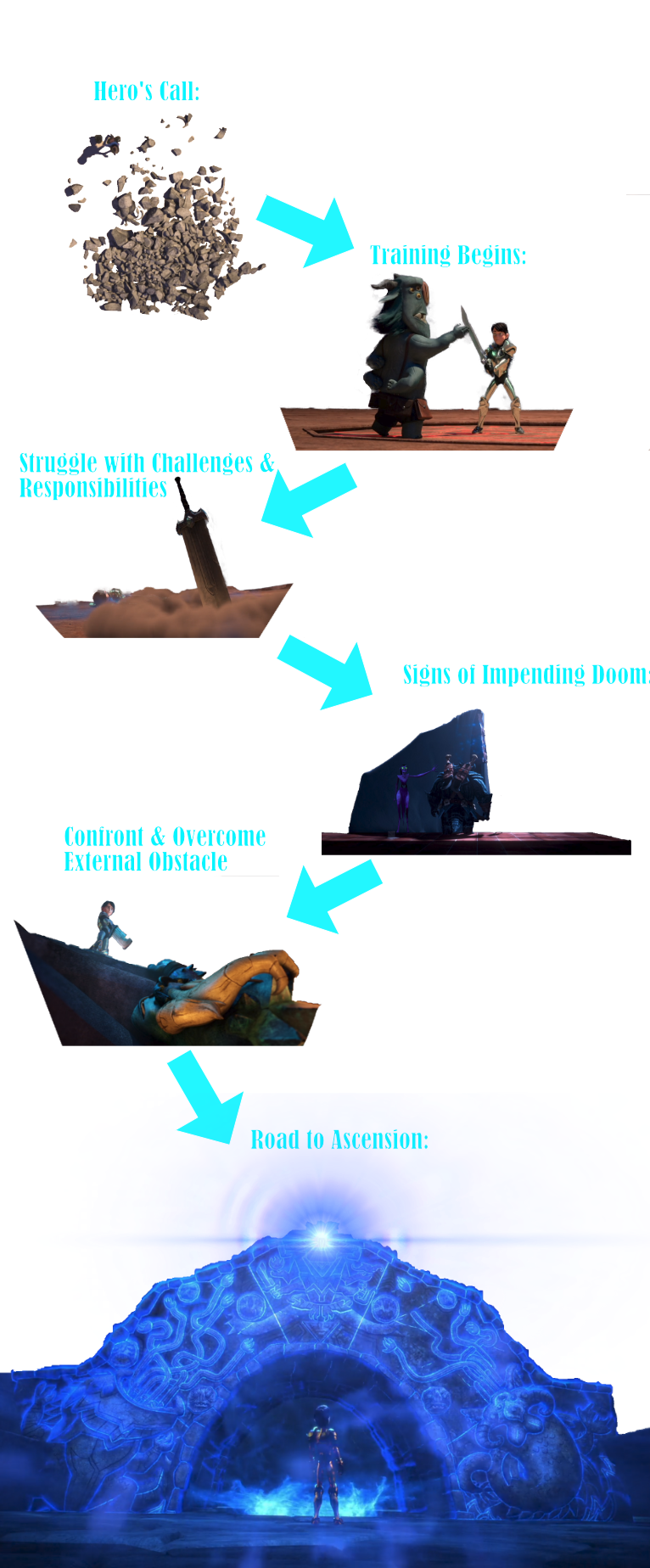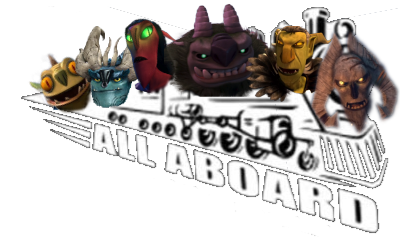Trollhunters: The Structure to Success
August 25, 2018
 I admit it, as a general rule I stay away from TV shows. Every time that I get invested in a premise, cheap delay tactics stack themselves high over evolving the plot and characters, or the writers in charge are just blatantly incompetent at delivering on the macro level.
I admit it, as a general rule I stay away from TV shows. Every time that I get invested in a premise, cheap delay tactics stack themselves high over evolving the plot and characters, or the writers in charge are just blatantly incompetent at delivering on the macro level.
Trollhunters is a resounding exception to the rule. It has sustained my interest enough to stick through its three seasons and write this up.
I covered one of Guillermo del Toro’s other work previously in The Shape of Water review before, but if there was ever a crown jewel of his to catch my attention, Trollhunters is that.
It’s an easy premise: teenager Jim Lake Jr. comes across an amulet on his way to school one day, after it has chosen him to be a champion and protector of trolls, who have lived underneath the feet of his town, Arcadia, since before he was born. Somewhere in the Darklands—a.k.a. allegorical hell—a discount Lich King by the name of Gunmar the Black is trapped, plotting to be freed from his prison to lay waste to all of mankind in the surface world.
As always, spoilers abound below!
Character’s Character Characters Character:
For those of whom need a refresher on the cast of characters ample enough to declare their own independent country, here are the most relevant names that I will be talking about:
Jim Lake Jr., Claire Nuñez , Toby Domzalski, Blinky, AAARRRGGHH!!!, Vendel, Strickler, Barbara, Draal, Nomura, NotEnrique, Kanjigar, Gunmar. Usurna, Angor Rot, Merlin, the Pale Lady / Morgana,
Sure, it might be intimidating, but they’re all introduced very organically, and far exceed the development most TV shows allot for their characters. And that’s exactly why it’s kept me entertained until the end.
It’s a fresh, superhero story-esque story that doesn’t fall off the wall after one or two seasons, unlike CW’s DC shitfest run of Arrow, Supergirl, Flash or Netflix’s Marvel series of Daredevil and Jessica Jones .
Why is that? Well for one, we have a linear progression of conflict and character development as opposed to the latter examples, which are circular and episodic.
This isn’t me showing my favoritism for the Hero’s Journey, it’s just plain, fundamental storytelling. If you build pieces on top—rather than in the general vicinity—of each other, the stakes are higher, the plot is richer, and the characters become more personable. Most crucially, it provides carryover from one episode to the next. I can’t believe I have to explain this concept, but confining potentially important aspects of a story to one episode where they can otherwise redefine the entire trajectory of the story is a frustrating if not fatal mistake in trying to captivate an audience’s loyalty. Some may still stay tuned, but their attention to detail is lowered because they don’t need to pay attention.
To be fair, this is spread out in varying degrees of quantity in shows. I find Arrow and Supergirl more guilty of this than, say, Daredevil. But still, what Daredevil didn’t repeat in each episode, they did for their second season with diminishing returns in quality. Daredevil was fun to watch because of Fisk, not Murdock. Seriously, Murdock is just a punching bag of justice who, in his spare time, plays hot-potato flings with Karen, Claire, or, Elektra. What does Jim Lake Jr. do in his second season? He charges into the Darklands, stranding himself there with no lifeline or plan of escape in a place where every evil thing, including Gunmar, wants to mount his head on a wall. Why does he do it? To save Claire’s baby brother, Enrique, who is trapped there.
Not only did Jim take the initiative into conflict rather than having conflict arrive right on his doorstep—an all too common dampener in superhero shows—, but he also learned an important lesson about his friends. They proved capable of protecting themselves when they find a way to find and save him when he is imprisoned.
Or, more accurately, Kanjigar finds and save him with some convenient clairvoyance and spirit energy mumbo jumbo that was never properly explained or developed. Sure, it’s a bit of a frail link in the chain, but these mistakes are more readily forgiven when your show has a bigger picture in mind.
One pitfall I remember chiefly about Daredevil and Arrow is so many characters come from the hero’s past. Good, bad, somewhere in between—it doesn’t matter. They’re there in abundance. It’s stupid for two reasons:
1. Disconnect between audience and hero’s knowledge. Their relationship is preestablished off-screen. If they’re new to the show, why not make them new to the hero?
2. So, so, so passive! It almost feels like the prime point of the story has come and gone on the show’s timeline before the pilot has even aired! Why bloat the reader with backstory when, with a simple set of revisions, it can happen concurrently in the episode itself?
Also, remember that Trollhunters is a kid’s show, whereas all the others are not. So whatever advantages with production Trollhunters might have had in production are offset by that limitation.
The Shallow Spots:
I still don’t know how to sum up this show now that’s it’s all said and done. In some episodes it feels like the peak of storytelling, and then sometimes it mellows a bit, but then there are just some points and time where things just take an uncharacteristic dive into cement.
I mean look at the premise from a different perspective.
Jim Lake is a perfectly adjusted, completely independent 16-year-old, who is better than a majority of adults. His single mom, Barbara is, repeatedly shown to be an incompetent failure of a parent. She can’t make her own breakfast, let alone Jim’s; the rare instances she is home she’s dead on a bed, or inviting guests over for dinner without any care or forewarning to Jim.
But it’s all good because perfect Jim takes care of everything around the house, makes her breakfast each morning she sleeps, packs her a bag of lunch, and that’s it.
Literally, that’s it. First episode of the first season, red flags going off virtually everywhere, and this issue is never—never delved into as a later plot point. In fact, this isn’t even an issue in the show’s eyes.
I mean, granted Jim is 16, but even still. There is no grudge? No larger demon between them? No unspoken animosity that festers over time? No, sirree, this is a totally functioning, happy family with healthy relationships!
To add salt to the wounds, Jim’s father has only left so the position could be vacant for Strickler and Blinky to ambiguously share as surrogates later on. I don’t despise a-day-in-the-life type openings, unlike a lot of people, but dear Lord, make the life already in motion. Jim is too together, too void of issues, that he becomes more of a sponge to absorb the plot than a man to actively instigate it.
And I haven’t even gotten to the part where Barbara decides to start dating Strickler, whom she only knows as Jim’s teacher.
Isn’t there a sort of maturity in which parents do not date the staff of their children’s school? Nor do thirsty teachers accept these advancements from parents?
I mean Strickler gets a pass, since he’s initially a bad dude doing this with ulterior motives while he was a teacher, but Barbara is just insufferable in her defiant response to Jim’s protests. And without a single redeeming quality about her except that she’s a mother, it’s hard to stomach her involvement in the story as a protagonist whatsoever.
I categorically hate amnesia as a plot device, but even I will champion it when it keeps Barbara Lake out of the damn story for as long as humanly possible.
Outside of the house, there is also a tacky high school play of Romeo and Juliet coming up in season 1, which just makes me groan just thinking about it. It’s cliché, lacks any form of creative spin, and just doesn’t fit either Jim, nor Claire. Sure, it could just be some growing pains as the writers tried to get comfortable with Claire’s place as a character, but you’ll notice it doesn’t suit her from the get-go. And as her arc goes on, the original play seems even more and more out of place.
Speaking of arcs:
We have a bustling car today! Six people are going to the Redemption arc station today! SIX! Those passenger include, ARGH!, Draal, NotEnrique, Strickler, Nomura, and Angor Rot!
The redemption arc is my favorite arc in literature, but seriously? Even the best path gets worn down when you have half a dozen of the show’s villains doing it! Is Jim a warrior or a missionary for evil trolls seeking salvation?
This is actually a huge flaw within the story, seeing as systematically, the tools of the antagonist (Gunmar and Morgana), are stripped away as their signature fighters change allegiance.
Not to mention the most heinous slip up of all: at the very climax of the last season, the Eternal Night is stopped only by a split-second decision on the part of Angor Rot to not finish Jim off.
Forget Jim having trained months on end, fighting beasts of increasingly prodigious strength, putting life, limb, and love on the line, and irreparably transforming himself into a troll to become stronger. Nah, dude. The thing that mattered most—what decided the fate of the world at large—was this mid-battle statement:
“Kill me. It won’t change you. I heard you were once a great warrior. A hero to trollkind.”
-Jim Lake Jr.
Following this, Angor Rot drops out of a 2v1 fight with Jim and Gunmar, affording Jim the opportunity to take the upper hand and get the best of Gunmar. Which he does.
Oh, but it doesn’t end there! Jim gets yet another lucky break when he and all his friends are tied up, under wraps by Morgana, who gives Angor Rot the honor of finishing Jim off, in which he betrays her, affording Jim the opportunity to take the upper hand and get the best of Morgana. Which he does.
There is no set cap for characters changing their diplomacy. There is, however, a deadline. After a certain point, those character must stay on their side of line, so that the conflict actually, dare I say it, unfolds!
Jim Lake never needed to overcome pride, impatience, or a lack of empathy, so why is this the mechanism that seals the fate of his two most menacing foes in the series finale?
Theme vs. Twist:
Here’s a little known secret about stories: satisfaction is more valuable than shock. And I find that the dramatic twist of season 3 was a complete blunder. I’m, of course, talking about Jim’s transformation into a troll.
I’ll concede that they executed on the move perfectly, leaving an absolutely emotionally gut-wrenching episode that takes the transformation of Jim Lake Jr. in an existentially sobering light. But perfect execution of a poor move, is still nevertheless, a poor move.
The entire premise of Trollhunters is that Jim is the first human trollhunter. Of course, this comes with a great deal of obstacles and ramifications, including Heartstone Trollmarket’s less than gracious acceptance of him, his lacking physical demeanor, and him having a full-time life in the surface world.
Ultimately, Jim’s time as the trollhunter is defined by being unorthodox. Sometimes to such an extent that it brings him into trouble, but nevertheless that has been a central theme to this story. He recruits allies in his friends, shows mercy to enemies defeated—such as Draal, Strickler, and Nomura—, and he also takes extraordinary risks to save individual lives (such as Enrique) from the Darklands.
Having Merlin magic him into a troll strikes me as grossly compliant and unobservant of Jim. He has not suffered such overwhelming losses for this to be the only conceivable way to kill Gunmar. Additionally, the message of him bringing together the two worlds kinda crumbles with this decision. This, and many other themes, are the lifeblood of the show.
Theme: a recurring lesson, identity, or principle that is established and consistently upheld through a story’s development.
People like to knock macro-structure and emblematic storytelling in the modern world, where its assumed every work of fiction is unilaterally told as a literal adventure in a fictional world, but symbolism still matters. As do themes. They unify the events into a demonstration of human experience. Be it by commentary, subliminal messages, or fables, it’s woven into the fabric of the story, intangible, yet inseparable. To sum it up in layman’s terms, it’s that unspoken, satisfying feeling you get when outlandishly different aspects of a story connect in a harmonic way.
Some of the themes Jim’s troll-turning comes into conflict with most are, as I said earlier, him taking his own path to discover the trollhunter he will be, and being a part of a team.
As it turns out in season 3, Merlin planned for Jim to become a troll one day, This goes against the very nature of the self-determinism Jim espouses throughout his journey as a trollhunter. He forfeits this for strength, that tips the scales of balance, making him, in every way except in name, a full troll.
Furthermore, he makes this decision alone, shutting out Claire, Toby, Blinky, and ARGH! once again. This is no different from the time he locked himself with Killahead Bridge to face the Darklands alone—overwhelmingly considered a mistake afterwards. And yet, Jim repeats it this time, and it ends up being the correct move.
Sure, it could go both ways in real life, but this isn’t real life. A story is more than a sum of its events. If a character is wrong, he cannot squeak through that error unscathed. And by following the story’s own internal logic, Jim made the wrong choice again. This should have caused conflict, but instead it resolved some.
In Summary:
No story is infallible, certainly. If it was, it would probably be a dull and boring affair. Trollhunters still remains, to me, as a phenomenal show, with an ever brighter future ahead of it as the Tales of Arcadia spin off/ expansion series is coming out this fall. It’s my hope in reviewing this, giving the good and the bad, that more people pay attention to these kinds of stories, because they don’t come around often, especially in TV shows.
It is a fantastic adventure that keeps me hopeful that, from its success, it may lead and inspire other shows of similarly high quality, and dispel the myth that children shows and scifi and fantasy are solely vessels for escapism and geekdom without serious weight or substance behind them.
Thousands of years, life has been taught, portrayed, and explored through a fantastical lens. Learning and growing can take many forms, but the lessons we best absorb are compressed in tales rife with imagination, wonder, and purpose not unlike what Trollhunters has displayed in its prolific, three seasons.
I remain wholly excited with what sorts of wonders the upcoming spin-off titles have in store for us!
❤️ Whitney liked you! Click Here: http://bit.do/fSRzN ❤️
❤️ Ana want to meet you! Click Here: http://inx.lv/p0Df ❤️
a Maria – Dance, Maria [Official Music Video]! Click Here: https://youtu.be/E5DYlF6_x2U